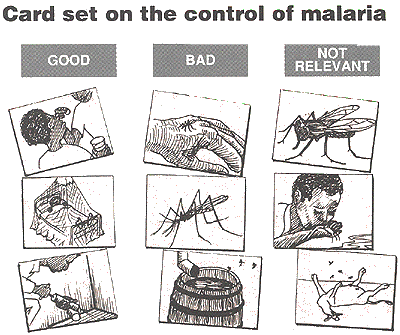Sets of cards are needed - usually each set has between 15 to 25 cards. Each card has a picture of a scene which could be interpreted as good, bad or not relevant. There are many different subjects which can be used for the cards. For example, we have produced sets on family planning, water and sanitation, immunisation, food hygiene, malaria control and control of diarrhoea. Ideally, an artist could adapt ideas for the cards so that they are appropriate for the local culture and situation. Otherwise pictures could be copied (see article in Footsteps No 8) or cut out of newspapers and magazines. It helps if the cards are well made, so that they will last a long time. If possible, they should be covered with plastic. Below are some examples for a set of cards on malaria control.
Method
- Divide the group into small groups of between 4 to 8 participants.
- Give each group a set of cards to study.
- Ask the group members to discuss the content of each picture card and to sort them into three piles: good, bad or not relevant.
Encourage each group to consider their choices carefully and make changes if necessary. It is important that all the group members are happy with the choice of cards in each pile. The aim is to encourage the group to think carefully about each picture, rather than to place them quickly in piles.
The trainer should make sure that the discussion keeps to the subject area and help with any difficult issues which are raised.
When all groups have finished, the cards in each group are displayed on a flat surface. A short presentation is made by one or two of the participants from each group to explain and, if necessary, defend their choice of cards.
The Kumasi Health Education Project has successfully used this material with teachers, school pupils and community health workers. The adaptations of this material for different subject areas are limitless. The materials have been used in clinics, classrooms, markets, compounds and church groups.
Sent in by... The Kumasi Health Education Project, PO Box 1916, Kumasi, Ghana, West Africa.







